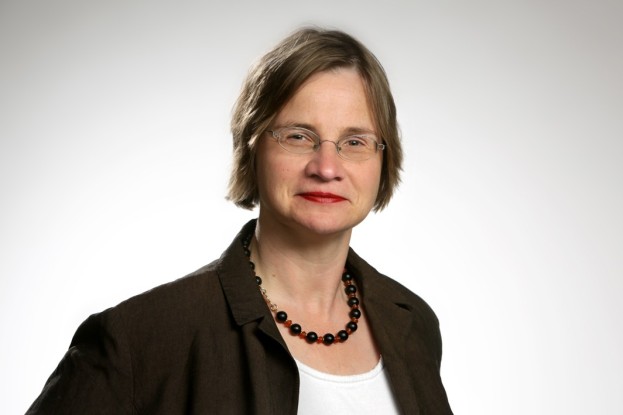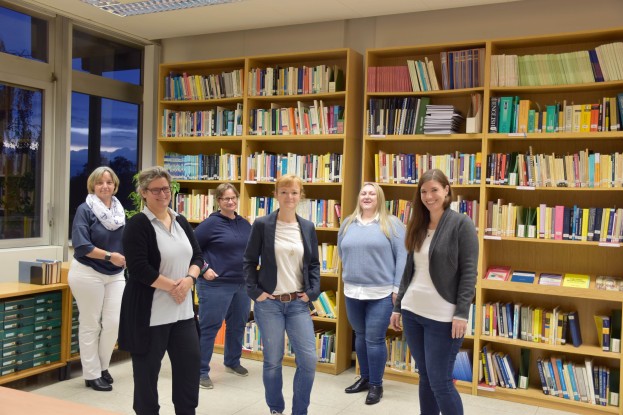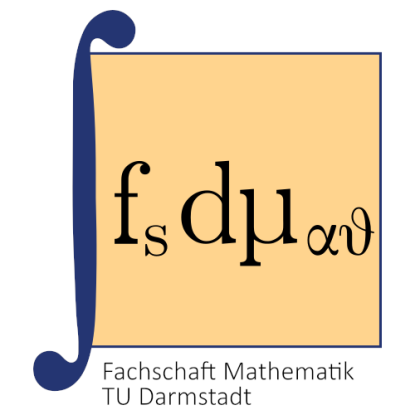FAQ for prospective students: Bachelor of Science and teaching programme
For the bachelor's programme it is also sufficient to have acquired a subject-related entrance qualification in Hessen or one that is recognized by the state of Hessen.
For the teaching programme you need the general higher education entrance qualification.
Details on the admission requirements can be found on the webpages of TU Darmstadt.
We cannot tell you that for sure. Every programme has its own requirements and difficulties. Especially in mathematics you will need diligence and perseverance. But of course you can count on our support thorugh professors and tutors, and of course through your colleagues. Mathematics is a team sport and working as a team is always easier than working alone. Therefore we advise you to look for study peers as soon as possible!
There is no definitive checklist to tell if someone is suitable for studying mathematics. Nevertheless there are a few indicators:
- you are passionate about mathematics
- you like to solve brain puzzles
- Feedback from teachers
- Online Self-Assessment
- Feel free to attend our events as well as trial (or real) lectures.
Note that no above statement is a definitive requirement.
Much of mathematics certainly seems abstract and there is a reason for this, after all, its strength and elegance lies in reducing problems to their core in order to solve them.
Nevertheless, it is important during your studies not only to understand concepts that initially seem abstract, but also to develop a good intuition for them. In this way, mathematics becomes tangible and you find more and more references to everyday life.
In addition, mathematics is more concrete than any other science because, on the one hand, a mathematical approach is characterized by formulating things precisely and getting to the heart of the matter. On the other hand, mathematical results are absolute in the sense that – once proven – they simply apply and cannot/must not be constantly questioned by new findings or experiments.
When studying mathematics, the choice of a minor subject, which you can also continue and even deepen in the Master's program, allows you to maintain a connection to practice. Otherwise, however, you do not deal with specific application questions during your studies, but rather learn to familiarize yourself with complex topics in a targeted manner and to analyze correlations.
No, not necessarily. It does help because you get an idea of mathematical ways of thinking and working in the advanced course. However, the basics are taught in your studies, albeit in a compact and quick way. That's why the preliminary maths course that we offer is highly recommended. In any case, there are very successful students and doctoral candidates who “only” had a basic course!
Teaching mathematics at school is very different from studying mathematics: while mathematical procedures are often practiced and applied in school lessons, studying mathematics is more focused on proofs and problem solving when working on tasks. It takes some time at the beginning of the course to get used to the formal language of mathematics.
No, there are many uses for mathematically gifted people: Mathematics can be found in many subjects, from engineering, natural sciences and computer science to social sciences and economics. If you enjoy calculating, you will find a good application for mathematics in these subjects. If you want to get to the bottom of things, abstractly and perhaps initially without an application scenario in mind, then you are in good hands studying mathematics.
Studying at a university of applied sciences differs in many ways from studying at a university. The aim of a course at a university of applied sciences is to provide practical training in a manageable period of time (usually 6 to 7 semesters). The course of study is generally quite precise and the connection to practice plays a major role during the course of study. In most cases, longer internships are required and the lecturers usually have several years of professional experience from outside the university. Small student numbers allow for personal support. The aim of a degree course at a university is to provide a scientific mathematical education in breadth and depth. A degree course usually lasts 9 to 10 semesters, although it usually takes a little longer. There are many options to choose from, giving you plenty of scope for individual study, but the course also places greater demands on independence. Depending on the degree course and focus, practical knowledge and mathematical thinking are taught to varying degrees. Theoretical mathematics also plays a particularly important role as a foundation in an application-oriented course.
- Many fields of study, wide range of minor subjects
- Guaranteed Master's place and good doctoral opportunities
- Excellent career prospects
- Very good supervision ratio, as the department is well-staffed and very motivated,
- Bilingual courses and bilingual degrees
- Lots of application-oriented mathematics, as the Technical University
- offers many didactic courses for teaching
- Focus on exercises (learning by doing)
- Opportunity to study abroad for one or two semesters, over 70 partner universities worldwide
- Good opportunities to find jobs as an assistant in the department
- Very active student body (games evenings, ball, math choir, improv theater, music evenings, etc.) and generally wide range of leisure activities, e.g. ) and generally wide range of leisure activities, e.g. through university sports or university groups
- Very good start to studies thanks to lots of information in the orientation week and a good atmosphere among students
In the Bachelor's and Teaching Qualification for Secondary Schools degree programs, students can only begin their studies in the winter semester (except for students changing their place of study in the higher semester)
In the Master's degree programs, students can also begin their studies in the summer semester (except for international students outside the EU).
There is no NC for the Bachelor's and teaching degree courses.
However, it is important to note the application deadlines! The application period for the winter semester is from June 1 to August 31. Please check the TU Darmstadt website regularly. Sometimes this information changes. We also recommend that you apply early so that you have enough time to look for accommodation, for example.
For our Master's degree programs, a suitable Bachelor's degree is of course always a prerequisite for admission, otherwise there are virtually no requirements!
We offer a total of 5 degree programmes in the Department of Mathematics. The Bachelor's degree programme in Mathematics and Business Mathematics ends with a Bachelor of Science degree. If you have earned enough CP in English during your studies, your degree will also be awarded the supplement ‘bilingual’.
The Teaching Programme for Secondary Schools is completed with the First State Examination.
The Master's degree programmes in Mathematics (English with various specialisations) and the Master of Education (teaching degree at vocational schools) end with the Master of Science. The Master of Education programme requires a degree in a technical subject area with a mathematics component (linear algebra).
You acquire the bilingual certificate during your studies by taking a certain number of English-language modules totalling at least 50 CP. An essential prerequisite for this is that you take the ‘English for Mathematicians’ course. It is also advisable to take the first-year lecture Linear Algebra or Analysis in English (offered alternately in English), and you should also write your Bachelor's thesis in English. In addition, we offer compulsory lectures, seminars and elective courses in English.
The bilingual certificate is worthwhile if only for the fact that you can prove that you have a very good command of English with your Bachelor's certificate. In addition, you will regularly deal with the academic language English during your studies, which will prepare you optimally for further studies or a doctorate abroad. This will also increase your chances on the international labour market.
You cannot enrol directly for the bilingual degree programme; you decide whether or not to do so during your Bachelor's degree. Accordingly, you do not need any language certificates.
- Bachelor: 6 semesters
- Master: 4 Semesters (Master is the standard degree TU Darmstadt)
- Teaching degree: 9 semesters (state examination in the 10. semester)
- Master of Education: 4 Semester
On average, however, the degree programme takes 1 to 2 semesters longer. This is due, for example, to part-time jobs, studying abroad, (voluntary) commitments alongside their studies, or: many students simply take many more courses for fun and out of interest than they actually have to.
There are no tuition fees in Germany, and this is also the case at TU Darmstadt. However, students do pay a semester fee of around €350 per semester. This fee includes administrative costs as well as the Deutschlandticket, cheaper meals in the canteen and discounts for art, culture and sport.
Nobody has to worry about falling through the cracks, on the contrary. At the Department of Mathematics, we are proud of our extensive support services, which are also reflected in an unbeatable support ratio of 1:10: There is one teacher for every ten students – these can be professors, research assistants or student tutors.
We have an open-door policy at our department. If you see that a professor or research assistant's office door is open, you can approach them and ask your questions. Your tutors are available to you during office hours as well as via email or Moodle PN.
In addition to support from teaching staff, there are other programmes on offer: The orientation week at the beginning of the first semester. The mentoring programme, which all first-year students can take part in. The consultation hours of the study coordinator, the study office and the international coordinators. The student councilalso offers many different support options. You can also take advantage of the services offered by the university's central contact points.
Mathematicians are the ‘all-rounders of the labour market’. Mathematicians are always wanted and needed everywhere. The skills they acquire during their studies, such as problem-solving skills, their systematic and analytical way of thinking and their ability to abstract, grasp and structure complex processes, make mathematicians highly sought-after employees in companies.
Fields of activity are:
- Company organisation and management (controlling, finance, marketing, etc.);
- Banking (risk management, development of financial products, investment banking, etc.);
- Insurance (risk calculation, reserve calculation, tariff calculation, etc.);
- Electrical industry (optimisation of processes and systems, model development, simulation, etc.);
- Energy industry (network optimisation, transmission management, system optimisation, etc.);
- Information technology (software development, software testing, quality control, etc.);
- Aerospace (missile development, modelling and simulation, etc.);
- Market and opinion research (process and method development, data analysis, etc.);
- Pharmaceuticals (modelling, experimental design, evaluation, etc.);
- Teaching at school or university.
Mathematicians can choose their jobs and are almost never looking for work (unemployment rate of 2.7% [Dieter/Törner 2009]). The German Mathematical Society even states that only 0.8% of all employable graduates are looking for work.
Darmstadt is a real student city, but unfortunately – as in many other urban centres – it has become quite expensive in recent years. Student halls of residence, e.g. those run by the Studierendenwerk, are cheaper. However, the waiting time for a room can be up to a year. We therefore advise you to register on the list early. There are also many offers from private student residences. However, the vast majority of students find rooms in private shared flats.
Definitely! Darmstadt is – as we said – a student city, so the city has a lot to offer. Student parties, clubs, pubs, the Schlossgrabenfest or Heinerfest, but also the Woog, the Herrngarten, the Rosenhöhe or the Mathildenhöhe really make life in Darmstadt worth living.
Another advantage: you don't have to get up at 6 a.m. for the 8 a.m. lecture.
The mathematics specialisation offers you many different options. After the compulsory section, you can choose elective courses from all seven specialisations: algebra, analysis, geometry, numerical optimisation or stochastics. You also have a wide choice of minor subjects. Minor subjects such as physics or computer science are the most popular, but biology or philosophy are also possible. Mathematics is more theory-orientated and is the right subject for you if you are a tinkerer and puzzler.
If you prefer application-oriented work, the Business Mathematics degree programme is the right choice for you. The compulsory area here differs slightly from the compulsory area in the mathematics major, as you will definitely have to attend courses in stochastics and optimisation, for example. In general, the focus of this degree programme is on these two areas, as you will also write your final thesis in one of these two disciplines, for example. Your minor subjects are economics and computer science, whereby the proportion of subjects in economics is somewhat higher.
Yes, in the Business Mathematics degree programme, your minor subjects are definitely Economics and Computer Science.
You have a wider choice in the Mathematics specialisation: Standard minor subjects are physics, computer science, mechanics, chemistry and economics. However, minors such as mechanical engineering, biology, digital philosophy or philosophy are also possible.
You have to complete around 30 CP for the minor subject, i.e. 1/6 of your entire Bachelor's degree programme.
You can find more information about the minor subjects here.
- The Bachelor's programme takes 6 semesters, the teacher training programme takes 9.
- In the Bachelor's programme you choose a minor subject, in the teacher training programme you study another major subject in addition to maths and take courses from the so-called basic sciences
- In the Bachelor's programme you take at least 140 CP of mathematics courses, in the LaG it is 85 CP, which are made up of around 3/4 subject-related and 1/4 subject-didactic courses. In addition, there are 20 CP from the so-called networking area, through which a connection between your main subjects is to be established.
- The Bachelor's degree ends with a written thesis, the teacher training programme ends with the first state examination (written and oral examinations)
Subject didactics is about learning how to teach and learn maths from a scientific point of view. It examines what, why and how something should be taught or learnt.




